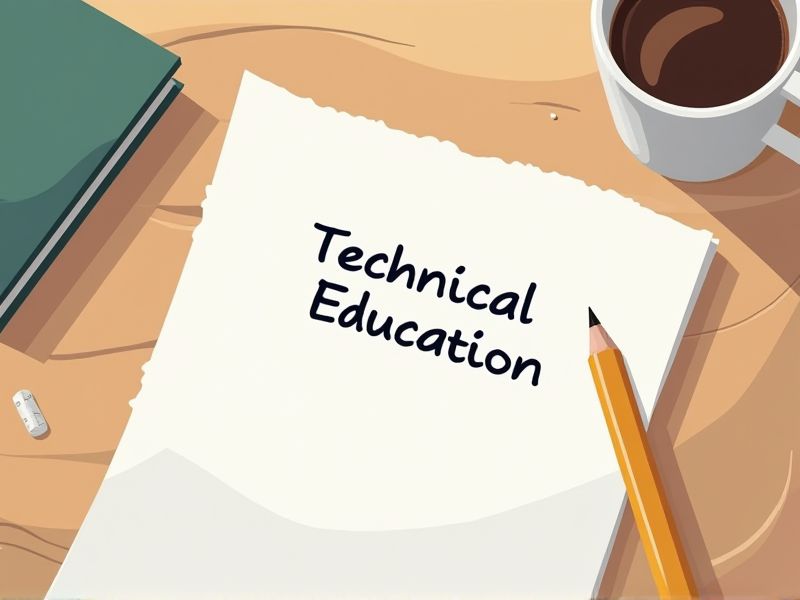
Technical Education Instructors need certain certifications to ensure they have the requisite knowledge and skills to teach specialized subjects effectively. Certifications validate the instructor's expertise, enhancing student trust and improving educational outcomes. They also keep instructors current with industry standards and technological advancements, crucial for delivering relevant education. Here are some important certifications you may need as a Technical Education Instructor.
CompTIA A+ Certification
The CompTIA A+ Certification establishes a foundational understanding of computer hardware and software, which is essential for instructors teaching technical education. This certification ensures that educators are equipped with the up-to-date skills required to effectively communicate and demonstrate technical concepts to students. The industry-recognized credential provides credibility, enhancing the instructor's ability to foster trust and authority in a classroom setting. By obtaining this certification, instructors can align their teaching methodologies with current industry standards, leading to improved educational outcomes.
CompTIA Network+ Certification
Technical Education Instructors with a CompTIA Network+ Certification possess validated knowledge essential for teaching practical networking skills. This credential ensures instructors can effectively prepare students for real-world network troubleshooting and maintenance. The certification enhances an instructor's credibility, aligning curriculum with industry standards. Consequently, students receive education rooted in recognized competencies, boosting employability.
Certified Technical Trainer (CTT+)
Certification such as Certified Technical Trainer (CTT+) enhances an instructor's credibility and demonstrates their competence in delivering technical training effectively. It helps ensure that technical education instructors possess structured teaching methodologies, allowing for consistent and comprehensive learning experiences. Certified instructors can cater to diverse learning styles, which increases student engagement and retention of technical knowledge. Organizations often prefer certified trainers to maintain a high standard in technical education and training programs.
Microsoft Certified Educator (MCE)
The Microsoft Certified Educator (MCE) credential ensures that Technical Education Instructors possess essential IT skills and are capable of integrating technology into teaching. This integration enhances students' learning experiences, thereby increasing their readiness for the digital workforce. Without such certification, instructors might lack the necessary competency to effectively prepare students for technologically advanced careers. As educational technology evolves, MCE-certified instructors are better equipped to remain current, fostering a dynamic learning environment.
Cisco Certified Network Associate (CCNA)
CCNA certification provides instructors with foundational networking skills necessary to teach complex technical topics effectively. Acquiring CCNA ensures instructors possess a validated understanding of networking concepts, aligning their knowledge with industry standards. This certification enhances the instructor's credibility, improving student trust and engagement in technical courses. CCNA equips instructors with the latest networking technologies and protocols, essential for delivering up-to-date education in a rapidly evolving field.
Adobe Certified Professional
Adobe Certified Professional serves as a benchmark for instructors, demonstrating proficiency in Adobe software, which enhances the quality of technical education programs. If instructors possess this certification, it instills confidence in students about the relevance and effectiveness of their learning experience. Industry recognition of the certification highlights an instructor's ability to teach current skills needed in digital design and media fields. The structured learning path and evaluation process of certification keeps instructors updated with evolving technologies and methodologies.
Autodesk Certified Professional
Having an Autodesk Certified Professional credential enhances an instructor's credibility, signaling to students and institutions that they possess a high level of proficiency in leading design software. It ensures that instructors are up-to-date with current industry standards and best practices, which translates into more relevant and practical learning experiences for students. Certification offers instructors access to resources and networks that can further enrich their teaching methods and material. Students taught by certified professionals are likely to gain industry-relevant skills that can boost their employability and career readiness.
AWS Certified Solutions Architect - Associate
A Technical Education Instructor with AWS Certified Solutions Architect - Associate certification gains credibility and authority, which helps in effectively teaching cloud computing concepts. This certification ensures the instructor has a concrete understanding of AWS services, leading to more comprehensive and accurate educational content for students. In-depth knowledge of AWS infrastructure empowers the instructor to design practical, real-world projects that enhance student learning outcomes. Familiarity with current cloud trends and technologies through certification keeps the instructor's knowledge relevant and up-to-date.
Project Management Professional (PMP)
Technical education instructors often guide complex course designs, and achieving a PMP certification equips them with essential project management skills to structure and deliver these courses efficiently. It enhances their ability to manage timelines and resources, ensuring educational projects meet set objectives without unnecessary delays. The certification provides instructors with methodologies to handle unforeseen challenges, leading to improved classroom experiences. With PMP expertise, instructors can better collaborate with stakeholders, aligning educational goals with institutional objectives.
Certified Information Systems Security Professional (CISSP)
CISSP certification equips technical education instructors with in-depth knowledge of cybersecurity concepts, which elevates teaching quality and content accuracy. The certification validates an instructor's expertise, building credibility and trust among students and educational institutions. Having a CISSP ensures instructors are up-to-date with industry standards, preparing students more effectively for real-world security challenges. Access to a global network and resources also enhances the curriculum with diverse perspectives and cutting-edge practices.
Summary
When you, as a reader, attain new certifications in technical education, your expertise and credibility significantly increase. This enhanced credibility often leads to improved employability and potential for career advancement. Employers tend to value instructors with updated skills and certifications, which can lead to better job opportunities and higher salaries. As a result, you can expect a more fulfilling career trajectory in the field of technical education.
